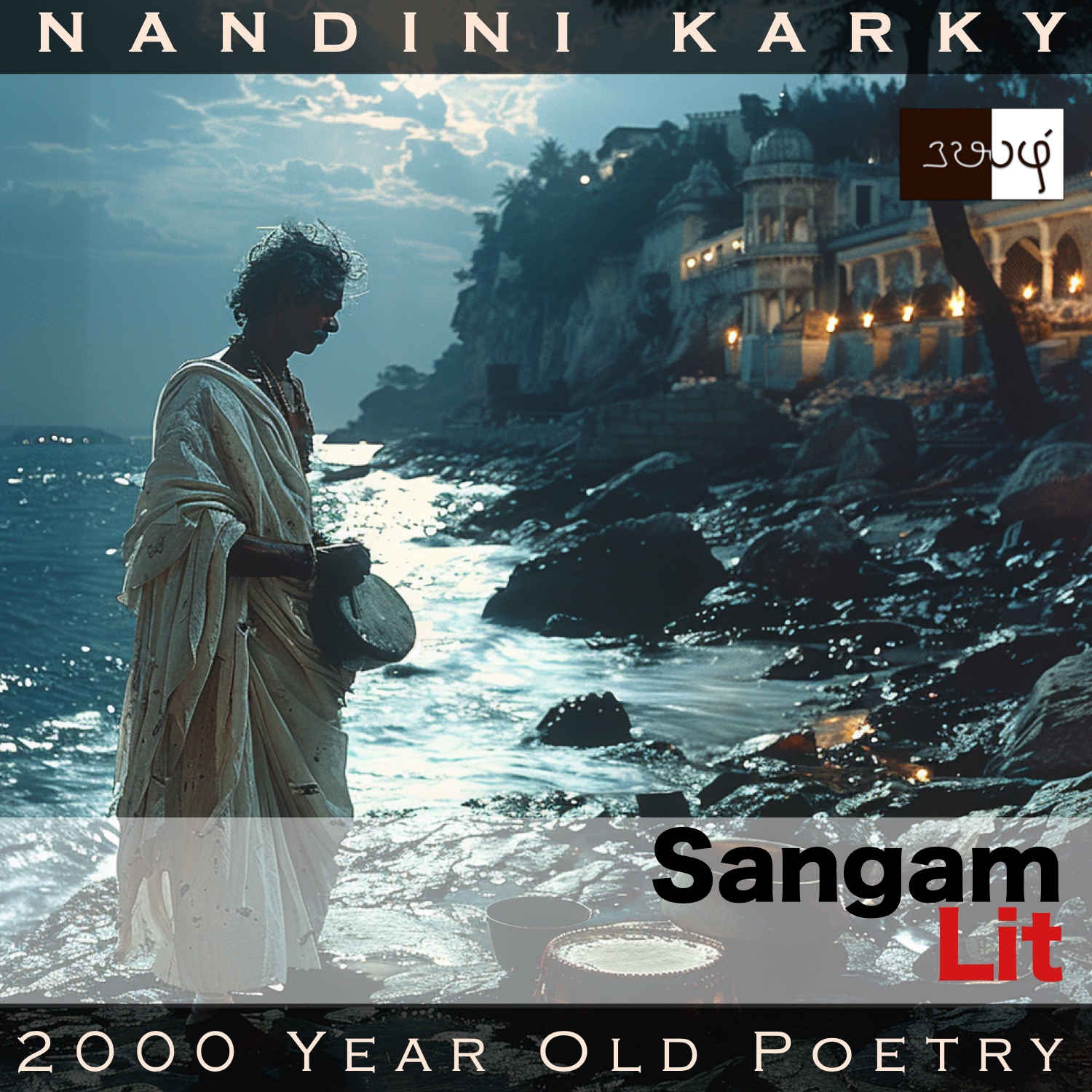Podcast: Play in new window | Download
Subscribe: Apple Podcasts | Spotify | Amazon Music | Android | iHeartRadio | TuneIn | RSS | More
In this episode, we perceive a poet’s contentment, as portrayed in Sangam Literary work, Puranaanooru 376, penned for Leader Oymaan Nalliyakodan by the poet Purathinai Nannaakanaar. Set in the category of ‘Paadaan Thinai’ or ‘Praise’, the verse sketches an unforgettable moment in the life of a poet.

விசும்பு நீத்தம் இறந்த ஞாயிற்றுப்
பசுங் கதிர் மழுகிய சிவந்து வாங்கு அந்தி
சிறு நனி பிறந்த பின்றை, செறி பிணிச்
சிதாஅர் வள்பின் என் தடாரி தழீஇ,
பாணர் ஆரும்அளவை, யான் தன்
யாணர் நல் மனைக் கூட்டுமுதல் நின்றனென்;
இமைத்தோர் விழித்த மாத்திரை, ஞெரேரென,
குணக்கு எழு திங்கள் கனை இருள் அகற்ற,
பண்டு அறிவாரா உருவோடு, என் அரைத்
தொன்று படு துளையொடு பரு இழை போகி,
நைந்து கரை பறைந்த என் உடையும் நோக்கி,
‘விருந்தினன் அளியன், இவன்’ என, பெருந்தகை
நின்ற முரற்கை நீக்கி, நன்றும்
அரவு வெகுண்டன்ன தேறலொடு, சூடு தருபு,
நிரயத்து அன்ன என் வறன் களைந்து, அன்றே,
இரவினானே, ஈத்தோன் எந்தை;
அன்றை ஞான்றினொடு இன்றின் ஊங்கும்,
இரப்பச் சிந்தியேன், நிரப்பு அடு புணையின்;
உளத்தின் அளக்கும் மிளிர்ந்த தகையேன்;
நிறைக் குளப் புதவின் மகிழ்ந்தனென் ஆகி,
ஒரு நாள், இரவலர் வரையா வள்ளியோர் கடைத்தலை,
ஞாங்கர் நெடுமொழி பயிற்றி,
தோன்றல் செல்லாது, என் சிறு கிணைக் குரலே.
It’s interesting how after traversing in various directions, we are back to celebrating leaders and kings in this segment of Puranaanooru verses. The poet’s words can be translated as follows:
“Crossing the sky’s horizon, the sun dimmed its delicate rays in that moment of dusk. A little while later, embracing and playing on my thadari drum, well-tied with leather straps, when bards were having their food, I stood near the storehouse of his prosperous, fine mansion; Even before I could blink my eyes, with great speed, as the moon that rose in the east removed the thick cover of darkness, as I stood with my old form, unrecognisable, and the garment around my waist, full of holes, its fibres worn out, stressed and stained, looking at my attire, he said with great magnanimity, ‘This newcomer is to be pitied’, and took the cymbals I held in my hand, and offered toddy that seemed like a hissing snake, along with hot meat, and thus, removed my hell-like poverty, right on that day. Even though it was night, my lord rendered gifts many unto me!
From that day onwards, now and hereon too, I will never ever thinking of begging, for he is the raft that takes me to safety across the sea of poverty; I have the ability to understand the depth of hearts. Akin to an overflowing pond, is my joy; Even for a single day, even in the front yards of generous people, who never refuse supplicants, singing their tall praises, the voice of my little ‘Kinai’ drum shall never resound!”
Time to explore the nuances. The poet starts by talking about one day, when the sun had set and its tender rays had vanished from the skies. A little while after this time, the poet found himself at the gates of a rich mansion, with granaries plenty. It was the time of the day when bards were welcomed and served with food there. At this time, the poet seems to have stood near a granary and started playing on his ‘thadari’ drum. Just a moment it takes to blink one’s eyes passed, and the leader of the house stood near the poet. None of the poet’s old form remained and this leader had no way of recognising him, so thin and wretched he was, and his clothes were full of holes, tattered and stained too. Seeing the poet’s state, the leader took great pity on him, and immediately took the cymbals that the poet held in his hand and offered him toddy that seemed to hiss like a snake, such was its strength, as well as delicious pieces of hot meat. Even though it was late in the night, the leader showered so many gifts upon this poet, that the leader appeared to the poet like a raft that was moving him safely to the shore, away from the sea of poverty. Just that moment, the poet decided that he is not going to sing about anyone else, no matter how generous, and how sure of obtaining gifts from them. This is because he had all he wanted, received from the hands of this leader he met on that dark night. The poet concludes saying that he has the vision to understand people’s hearts, meaning he truly knows what the leader’s worth is, and also, how his own heart is brimming with happiness like a pond, overflowing with water.
The poet’s joy, relief and contentment does brim over from these words and spill over in a tangible, timeless expression that we can understand. Even though so exuberant the praise is, some practical questions entered my mind about whether this leader could take care of the poet for his entire life. Were these words sung just in the relief of that moment or is that decision never to go to anyone else a permanent resolution? Even if this leader could take care of this poet during his lifetime, what about after that? All these questions arising within make me think the song is just what the poet feels at that moment, after his long and tired journey, seeing no hope anymore, and finally, receiving such compassion and love, so much so that the poet feels he should glorify the leader so. And we can conclude that this verse is all about the what the heart feels in a moment, perhaps taken for granted by others, but which seems, to the person experiencing it, as the turning point of their life!




Share your thoughts...